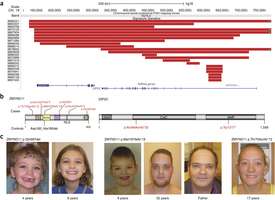September 15, 2014 report
Researchers develop new type of genetic test for identifying developmental disorders

(Medical Xpress)—A large team of researchers with members from a host of countries across the globe has conducted an exhaustive study that has resulted in the development of a new genetic test to help identify development disorders in children. In their paper published in the journal Nature Genetics, the researchers describe their study, the results they found and what it might mean for children with development disorders in the near future.
Some children have developmental disorders, it's a sad fact of life. Some are mentally related, others physically. Also, some disorders have been identified and classified, and others have not—and some disorders have been linked to genetic causes, while others have not. Another sad fact is that quite often developmental disorders are a precursor to later challenges as the child grows older, such as autism, schizophrenia, bi-polarism, etc. The challenge is to find all, or at least as many as possible genetic links to development disorders in order to best help those that are afflicted and their families. In this new effort, the team sought to find specific genes responsible for certain development disorders, and they appear to have done just that.
The researchers started by analyzing DNA obtained from 29,000 children diagnosed with a developmental disorder. Copy number variants (CNVs) found in the samples were compared with DNA taken from 20,000 adults that had not experienced any development disorders. CNVs are repeated chunks of DNA with errors in them—they are indicators of problems, but aren't enough to identify which ones, or to be of use for implicating individual genes. By comparing the samples from the children with the adults, the team was able to see which CNVs were actually linked to developmental disorders. In the study, the team found 70 of them.
To find out which genes in those CNVs were causing the problems, the team obtained DNA samples from 5000 children who had been diagnosed with a developmental disorder but did not have associated CNVs. Comparing them with the CNVs from the 70 that did allowed the researchers to identify 10 individual genes responsible for causing developmental disorders. This means going forward that DNA analysis of newborns can reveal early on whether those tested have such genes, offering doctors and parents an early diagnosis of a small number of such disorders.
More information: Refining analyses of copy number variation identifies specific genes associated with developmental delay, Nature Genetics (2014) DOI: 10.1038/ng.3092
Abstract
Copy number variants (CNVs) are associated with many neurocognitive disorders; however, these events are typically large, and the underlying causative genes are unclear. We created an expanded CNV morbidity map from 29,085 children with developmental delay in comparison to 19,584 healthy controls, identifying 70 significant CNVs. We resequenced 26 candidate genes in 4,716 additional cases with developmental delay or autism and 2,193 controls. An integrated analysis of CNV and single-nucleotide variant (SNV) data pinpointed 10 genes enriched for putative loss of function. Follow-up of a subset of affected individuals identified new clinical subtypes of pediatric disease and the genes responsible for disease-associated CNVs. These genetic changes include haploinsufficiency of SETBP1 associated with intellectual disability and loss of expressive language and truncations of ZMYND11 in individuals with autism, aggression and complex neuropsychiatric features. This combined CNV and SNV approach facilitates the rapid discovery of new syndromes and genes involved in neuropsychiatric disease despite extensive genetic heterogeneity.
© 2014 Medical Xpress















